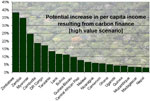Papua New Guinea to ban log exports by 2010
Papua New Guinea to ban log exports by 2010
mongabay.com
March 18, 2008
|
|
Papua New Guinea (PNG) will phase out log exports by 2010 said Forest Minister Belden Namah last month. The move comes as the country seeks to gain greater control over illegal logging and promote expansion of oil palm cultivation.
The National reported that the phase-out could result in the loss of PGK450 million ($166 million) worth of revenue from raw log exports annually. However the impact is expected to be offset by increased revenue from downstream processing of timber. Raw logs — which are often exported to China, sometimes illegally — offer the lowest economic return on timber resources and provide less opportunities for employment than higher-value processing industries.
Namah also announced a tripling of the timber royalty paid to landowners, from PGK10 ($4) to PGK30 ($11) per cubic meter (logging in PNG can yield 25 cubic meters per hectare).
Companies that fail to comply with the new laws will see their timber permits revoked said Namah.
More than 60 percent of Papua New Guinea is forested but between 2000 and 2005, the country lost an average of 250,200 hectares of old-growth forest per year, according to the U.N. Overall PNG lost 4 million hectares of primary forest between 1990 and 2005.
Related articles
How activists and scientists saved a rainforest island from destruction for palm oil
(2/12/2008) In mid-January, Mongabay learned that the government of Papua New Guinea had changed its mind: it would no longer allow Vitroplant Ltd. to deforest 70% of Woodlark Island for palm oil plantations. This change came about after one hundred Woodlark Islanders (out of a population of 6,000) traveled to Alotau, the capital of Milne Bay Province, to deliver a protest letter to the local government; after several articles in Mongabay and Pacific Magazine highlighted the plight of the island; after Eco-Internet held a campaign in which approximately three thousand individuals worldwide sent nearly 50,000 letters to local officials; and after an article appeared in the London Telegraph stating that due to deforestation on New Britain Island and planned deforestation on Woodlark Island, Papua New Guinea had gone from being an eco-hero to an ‘eco-zero’.
 |
Avoided deforestation could send $38 billion to third world under global warming pact
(10/31/2006) Avoided deforestation will be a hot point of discussion at next week’s climate meeting in Nairobi, Kenya. Already a coalition of 15 rainforest nations have proposed a plan whereby industrialized nations would pay them to protect their forests to offset greenhouse gas emissionsm. Meanwhile, last month Brazil — which has the world’s largest extent of tropical rainforests and the world’s highest rate of forest loss — said it promote a similar initiative at the talks. At stake: potentially billions of dollars for developing countries. When trees are cut greenhouse gases are released into the atmosphere — roughly 20 percent of annual emissions of such heat-trapping gases result from deforestation and forest degradation. Avoided deforestation is the concept where countries are paid to prevent deforestation that would otherwise occur. Policymakers and environmentalists alike find the idea attractive because it could help fight climate change at a low cost while improving living standards for some of the world’s poorest people and preserving biodiversity and other ecosystem services. A number of prominent conservation biologists and development agencies including the World Bank and the U.N. have already endorsed the idea.
China’s Olmypics may destroy New Guinea’s rainforests
(5/1/2006) Construction for the 2008 Olympics in China may fuel deforestation in New Guinea according to an article published last week in the Jakarta Post. The article reports that a Chinese company has asked the Indonesian government for permission to establish a timber processing factory in Indonesia’s Papua province to produce 800,000 cubic meters of merbau timber in time for the Olympic games to be held in Bejing. Merbau — a dark hardwood found in the rainforests of New Guinea — is used for hardwood floors and currently commands prices of up to US$138 per square meter, making the proposal potentially worth more than a billion dollars.
Home Depot, Lowe’s selling illegal wood from Papua New Guinea-Report
(3/23/2006) Consumers in the United States are being mislead as to the origin of merbau hardwood flooring being sold by Home Depot and Lowe’s. According to a new report published by the Environmental Investigation Agency and their Indonesian NGO partner Telepak, such timber is coming from the forests of Indonesia’s remote Papua Province, where 80 percent of logging is estimated to be illegal.